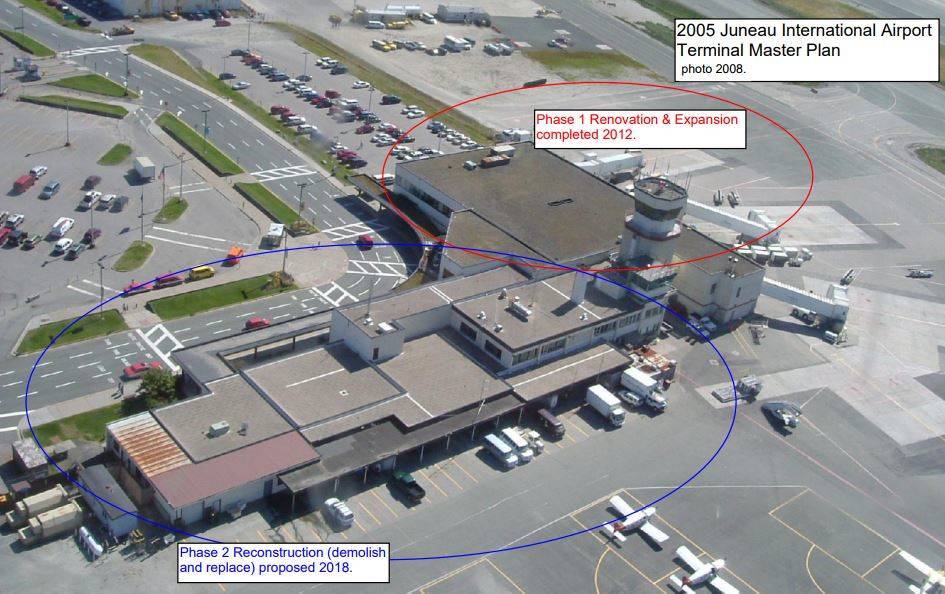About $50 million in projects is expected at the Juneau International Airport over the next five years, said airport board members Thursday during an annual joint meeting with the City and Borough of Juneau Assembly.
A big chunk of that work — $22 million — will be a taxiway reconfiguration. Another will be an overhaul of the airport’s north terminal that’s expected to cost about $21 million.
“That’s a lot of money coming into our city,” said Mayor Beth Weldon.
The terminal reconstruction project factored in significantly to the meeting’s discussion.
“This project comes not too soon as airport maintenance staff has at times had to employ much creativity to keep all the parts and pieces working,” said airport board chair David Epstein. “The phrase held together with chewing gum and baling wire comes immediately to mind.”
Airport manager Patty Wahto was not present at the meeting due to illness, Epstein said.
Angela Rodell, finance chair for the airport board, said generally speaking the state contributes almost nothing to the airport capital projects. About 5 percent comes from the city and 95 percent comes from federal sources, she said.
[Airport starts parking expansion project]
The north terminal is the oldest part of the airport, and Epstein said portions of it date back to the 1940s.
Work to reconstruct the terminal are expected to start about this time next year, Epstein said after the meeting, and would be anticipated to continue into 2021.
During the meeting, Epstein asked the Assembly to consider allowing an exception to a CBJ ordinance that requires Leadership in Energy and Environmental Design certification that he said could potentially add another roughly $1 million to the project’s cost.
Epstein said that estimated cost is based on what would need to be spent to ensure the reconstruction earned the certification and having someone certify it.
“I fully understand the importance of sustainable design in today’s world, however, I wish to point out the Juneau airport has already established a high bar in this area principally exemplified by the incorporation of a geothermal energy heat field into the main terminal reconstruction when it is completed.”
He said since federal money can’t be used for LEED certification efforts, that’s $1 million that would need to come from the airport.
Discussion among board and assembly members settled on the idea of the airport board proceeding with making a presentation to the Juneau Commission On Sustainability, which would then share a recommendation with the city manager.
Some other resolutions
During an update on operational aspects at the airport, board member Dennis Harris provided an update on things the airport is doing after Federal Aviation Administration and Department of Labor inspections.
Harris said in January, the FAA audited the airport as part of a compliance check for a grant process and found four areas of corrections, and preliminary answers were sent t0 the FAA on March 8.
One of the audits findings was that the fire station is on airport property but does not pay rent to the airport. Harris said Capital City Fire/Rescue provides services to the airport, and those can be demonstrated as a reason for why rent is not paid.
[Feds to help fund Juneau’s drug enforcement efforts]
A U.S. Fish and Wildlife Service hangar is also located on airport property and had not been paying rent due to a decades-old agreement, but Harris said it has agreed to pay rent.
A family owns a parcel with a hangar located in the middle of airport, and the FAA requires that the family either pay rent for the property dating back to 2011 or the airport acquire the parcel. Negotiations are ongoing, Harris said.
Also, the FAA requested additional information about services — water, city, personnel services and more — for which the airport pays the city.
Harris said documentation has been forwarded to the FAA.
City Manager Rorie Watt said he anticipated the other matters would be resolved in a “budget neutral” way.
Also, in June 2018 the U.S. Department of Labor found code violations, which Harris said have since been corrected with one exception — fall protection training.
“That’s scheduled with the state trainers now,” Harris said.
The airport was fined $34,000 for the violation, but Epstein and Harris said the Department of Labor allowed the airport to purchase safety items instead of paying the penalty.
“We bought things like first aid kits, defibrillators and equipment to help find foreign objects and debris on the airfield,” Epstein said.
• Contact reporter Ben Hohenstatt at (907)523-2243 or bhohenstatt@juneauempire.com. Follow him on Twitter at @BenHohenstatt.

